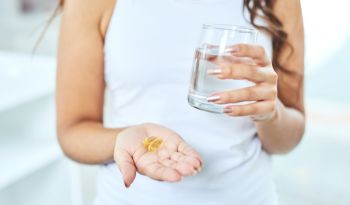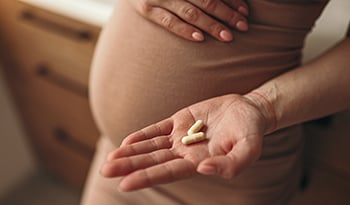4 Factors To Consider When Trying to Get Pregnant

While some women find that they are easily able to conceive, not everyone shares this experience and some may find it difficult to become pregnant. It is important to have conversations with your physician about your efforts and experiences around becoming pregnant in order to develop the best approach to increasing your chances of conceiving. Here are some things to consider assessing when it comes to fertility.
1. Fertility Foods and Supplements
Some women ask about natural ways to increase fertility and some literature has supported different dietary and lifestyle factors that may play a role in boosting the chances of becoming pregnant. For instance, consuming higher amounts of monounsaturated fats, vegetables rather than animal protein sources, low glycemic carbohydrates, high-fat dairy, multivitamins, and iron from plants and supplements may favorably influence fertility in otherwise healthy women.
Here’s what the research says about various dietary interventions and their impacts on fertility:
Folate and Zinc
The importance of folate and zinc has been demonstrated across multiple studies. A literature search revealed that zinc plays a role in sexual development, ovulation or the release of eggs, and the menstrual cycle. Zinc and folate both have antioxidant properties that may play a role in both male and female fertility. In men, particularly older men, a higher dietary intake of vitamin C, vitamin E, beta carotene, zinc, and folate may lead to production of sperm with less DNA damage.
Multivitamins
Another study demonstrated that regular use of multivitamin supplements may decrease the risk of infertility in women. It is important to remember that while diet and supplements may play a role as fertility therapies, traditional or conventional fertility therapies are also important and these approaches may serve best as adjuncts.
High-Fat Dairy
Higher intake of low-fat dairy foods may actually increase the risk of missed menstrual cycles and subsequent infertility whereas high-fat dairy food consumption in larger amounts may minimize this risk.
Monounsaturated and Polyunsaturated Fats
Trans unsaturated fats may increase the risk of infertility when consumed instead of carbohydrates or unsaturated fats that are commonly found in nonhydrogenated oils according to one study that implemented a food-frequency questionnaire across over 18,000 women without a history of infertility. Trans fats are usually present in margarine, processed and fried foods or baked goods. Opt for monounsaturated and polyunsaturated fats, which are better for your heart, cholesterol, and overall health in general.
Maca
Maca root is an edible plant that is native to South America. In nine adult normal men aged 22-44 years old, researchers investigated the effects of tablets of Maca (1500 or 3000 mg/day) over four months and found that Maca improved sperm production and sperm motility.
Bee Pollen and Royal Jelly
Bee pollen is another natural supplement of interest, but it has not been studied sufficiently in humans to date. It has only been evaluated in adult buck rabbits and has shown to have increased fertility and improved semen quality in this animal population.
Royal jelly is another example of a supplement that has yet to be studied in humans and has only shown potential effects on fertility in animal models in the lab. Further studies and research will be necessary to help determine the exact role that these natural supplements play in regard to enhancing or optimizing fertility for both men and women.
Fiber
When it comes to fiber, the data is inconclusive and no general recommendation can be made as to whether too much or too little fiber plays a significant role in increasing or decreasing fertility. In one study that followed 250 women between the ages of 18 and 44 for two menstrual cycles, it was shown that high fiber intake was associated with decreased hormone concentration and missed menstrual periods.
Moderate Soy Intake
Soy is another topic that has been historically debated and it earned attention when it was featured as leading to infertility problems across several headlines. Since then, many researchers, physicians, and nutritionists have clarified that levels of consumption would need to be excessive in order for either of these to lead to infertility. While animal studies have linked soy exposure to dysfunctional sexual reproduction and hormonal disruption, most advise that moderate consumption or intake (roughly 15 grams of soy protein and around 50-60 mg of total isoflavones daily) is safe and confers many health benefits.
Navigating the different types of carbohydrates and the best sources of vitamins and micronutrients or minerals can be overwhelming. Working with your physician and a registered dietician may prove helpful in navigating these complicated topics and developing a personalized, achievable, and successful plan.
2. How Body Weight Impacts Fertility
Another important consideration is bodyweight, which is known to relate to menstrual cycles. When underweight, women may miss menstrual cycles and this may lead to increased infertility. Intense physical activity and decreased body fat in athletes is a condition that is commonly seen and is associated with reduced fertility due to missed menstrual periods.
Alternatively, if sedentary and overweight, this, too, can lead to infertility. In fact, it has been shown that among American women, being overweight is associated with a higher risk of infertility than is being underweight. It is important to strike a balance with diet and exercise in order to achieve sufficient levels of key vitamins and nutrients while exposing yourself to healthy fats and staying active to maintain an appropriate weight. Maintaining moderation across diet, exercise, and overall lifestyle will help to achieve a balance that promotes general well-being.
3. The Effect of Caffeine, Alcohol, and Smoking on Fertility
Some women wonder about caffeine and alcohol intake and how these substances may affect fertility. High levels of caffeine or more than 500 mg daily has been shown to lead to a delay in conception among women who are fertile and otherwise healthy. An average cup of coffee contains around 95-100 mg of caffeine, as a reference point.
Low-to-moderate alcohol consumption does not seem to play a significant role in fertility. Of course, alcohol consumption once pregnant is not advised.
Smoking has been linked to women entering menopause at an earlier age than non-smokers, so quitting smoking is another natural way to extend a woman's fertile window. Similarly, for men, smoking has been shown to potentially have a negative impact on semen quality, making it an important factor for both sexes to take into consideration when looking to conceive and have a baby.
4. Stress, Anxiety, and Fertility
Stress, anxiety, and depression may also play a role in infertility, and decreasing levels of stress or managing anxiety and depression may be useful methods to naturally optimize fertility. There are different pathways in the body that play roles in conceiving and one study concluded that stress reduces the probability of becoming pregnant or conceiving a child significantly during time periods when women were most fertile. Stress may also play a role in hormonal fluctuation and lead to increased or decreased menstrual cycle lengths. Researchers investigated the association between stress and menstrual cycle length and found that cycles were typically longer when stress levels or stressors (defined as an increased demand for performance or adjustments to new demands) were higher.
Stress and anxiety do not only affect women’s fertility. In fact, one study determined that there is a strong linkage between anxiety and sexual stress in men. Infertility can prove stressful for both sexes and finding outlets to relieve anxiety and release stressful feelings is important for both partners. Based on the conclusions of these studies, decreasing stress and increasing relaxation in the bedroom when looking to conceive may be ways to naturally optimize fertility and increase the chances of conception.
Decreased sleep or insomnia may be factors that are contributing to feelings of stress or sadness. Be sure to evaluate your sleep habits and consider ways to improve the quality of your rest.
Other Considerations for Boosting Fertility
Some lubricants make it harder for sperm to reach an egg and accomplish fertilization. Certain natural lubricants, such as saliva and olive oil should also be avoided. It is recommended to opt for canola, peanut vegetable, mineral, or baby oils. There are also over the counter natural lubricants that you can explore that are specifically designed to be sperm-friendly.
Lastly, be sure to evaluate your home and work environment and ensure they are clear of pesticides or any industrial chemicals that may be interfering with your fertility or with your partner’s fertility.
Again, it is important to work with your physician, registered dietician, and other health specialists when developing a plan to naturally boost your fertility when you are ready to conceive. Additional clinical trials will be valuable in the future in helping us determine the best methods and ways to increase fertility for both sexes. Striking a balance and achieving a healthy overall lifestyle are important when looking to conceive as well.
References:
- https://www.ncbi.nlm.nih.gov/pubmed/18226626
- https://www.ncbi.nlm.nih.gov/pubmed/17978119
- https://www.ncbi.nlm.nih.gov/pubmed/17077236
- https://www.ncbi.nlm.nih.gov/pubmed/17099205
- https://www.ncbi.nlm.nih.gov/pubmed/22935557
- https://www.ncbi.nlm.nih.gov/pubmed/17624345
- https://www.ncbi.nlm.nih.gov/pubmed/17211965
- https://www.ncbi.nlm.nih.gov/pubmed/17329264
- https://www.ncbi.nlm.nih.gov/pubmed/17209201
- https://www.ncbi.nlm.nih.gov/pubmed/17882137
- https://www.ncbi.nlm.nih.gov/pubmed/19692496
- https://www.ncbi.nlm.nih.gov/pubmed/11489596
- https://www.ncbi.nlm.nih.gov/pubmed/16731787
- https://www.ncbi.nlm.nih.gov/pubmed/12629420
- https://www.ncbi.nlm.nih.gov/pubmed/11431132
- https://www.ncbi.nlm.nih.gov/pubmed/19801570
- https://www.ncbi.nlm.nih.gov/pubmed/11880759
- https://www.ncbi.nlm.nih.gov/pubmed/9688382
- https://www.ncbi.nlm.nih.gov/pubmed/9054236
- https://www.ncbi.nlm.nih.gov/pubmed/14645195
- https://insights.ovid.com/pubmed?pmid=21946090
- https://www.ncbi.nlm.nih.gov/pmc/articles/PMC4639396/
- https://www.ncbi.nlm.nih.gov/pubmed/20688324
- https://www.ncbi.nlm.nih.gov/pubmed/1983897
- https://www.ncbi.nlm.nih.gov/pubmed/17433317
- https://www.ncbi.nlm.nih.gov/pubmed/11753476
- https://www.ncbi.nlm.nih.gov/pubmed/20455966
DISCLAIMER:This Wellness Hub does not intend to provide diagnosis...
















































































 Table of Contents
Table of Contents















